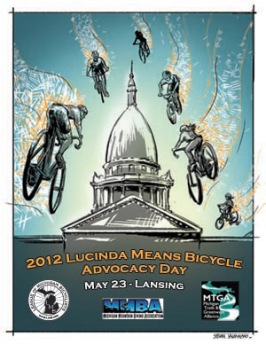Stand up for Complete Streets and the preservation of non-motorized funding at the 2012 Lucinda Means Bicycle Advocacy Day on May 23rd.
Bicyclists and Complete Streets supporters will meet with members of the Michigan Legislator on May 23rd at the State Capitol to advance legislative priorities aimed to make Michigan a more bicycle-friendly state. The event will be hosted by the League of Michigan Bicyclists, Michigan Trails and Greenways Alliance and Michigan Mountain Biking Association. All non-motorized transportation advocates are encouraged to participate.
Their Advocacy Agenda (PDF) includes a number of items such as establishing vulnerable roadway user designations for bicyclists, pedestrians and wheelchair users to create enhanced penalties for drivers who injure or kill a vulnerable roadway user. Advancing bikes-on-trains is another top priority. Roll-on bike service would allow cyclists to take bicycles on-board Michigan Amtrak trains, making multi-modal travel easier in Michigan. This would extend Complete Streets principles of connectivity further than a communities geographic boundaries by linking local bicycle networks and passenger rail service.
Also included in the Advocacy Day agenda are a few bills that are raising the eyebrows of Complete Streets advocates across the state. SB 921 (Ouiment) and HB 5304 (Jansen) were both recently introduced as part of Governor Snyder’s transportation funding reform proposals. Language in these bills, needlessly eliminates the Michigan Complete Streets Advisory Council (MCSAC). The Council, comprised of representatives from 18 statewide government and non-government stakeholder agencies, was created as a result of Public Act 135 of 2010. It is charged with providing education and advice to the State Transportation Commission (STC), county road commissions, municipalities, interest groups, and the public on the development, implementation, and coordination of Complete Streets policies.
To date, the MCSAC has focused its efforts solely on drafting recommendations for the STC regarding the statewide policy for MDOT. As a result, little guidance has been provided to local units of government across the state.
While Michigan leads the nation with the most adopted Complete Streets ordinances and resolutions (over 70 in total), many communities are still hesitant to advance Complete Streets until the MCSAC provides further recommendations. The MCSAC provides valuable oversight and guidance for the effective implementation of Complete Streets throughout the state. Dissolving the MCSAC will create an unfortunate void for communities seeking to make their roads and streets safer for all users. The collective expertise of MCSAC should continue to be utilized as MDOT and local communities work to implement the finalized policy.
Another bill of concern is HB 5303, which removes a funding requirement from Act 51 that obligates communities and road agencies to spend a minimum of 1% of their transportation funding on essential non-motorized transportation projects.
Worse yet, HB 5303 includes provisions that reward funding to road agencies based on the number of Vehicle Miles Traveled (VMT) under their jurisdiction. This creates disincentives for investments in alternative transportation options such public transit systems and bicycle networks.
The bill penalizes communities and road agencies for making systemic improvements like “road diets,” a popular technique that reduces the number of travel lanes on roads designed to carry more vehicle traffic than they do in reality. A common “road diet” improvement converts four-lane roads that have lower traffic volumes into two-lane roads that also include center turn lanes and additional safety features such as bike lanes, creating new transportation options without causing additional congestion.
You can learn more about these issues and register for the 2012 Lucinda Means Bicycle Advocacy Day at www.LMB.org/advocacyday.











Leave a comment
Comments feed for this article